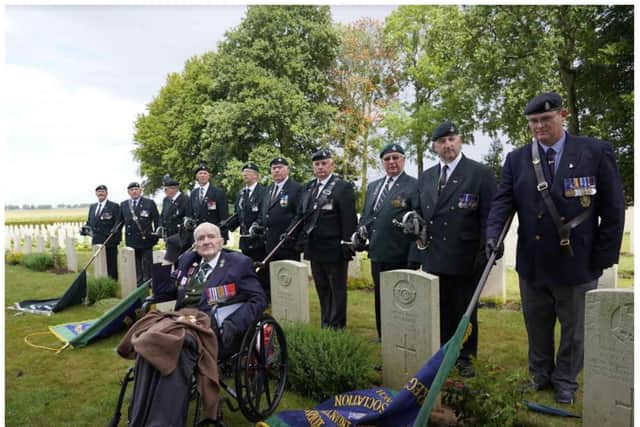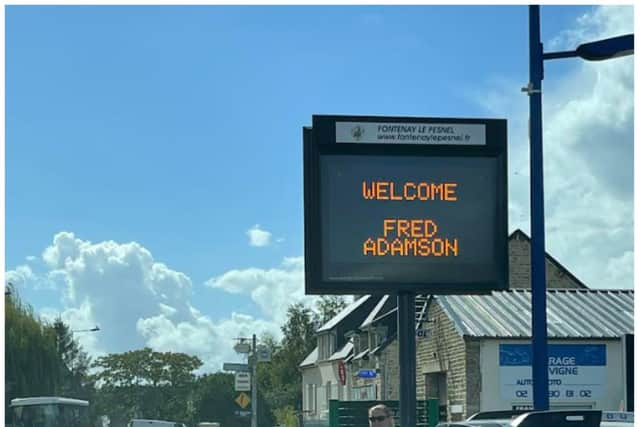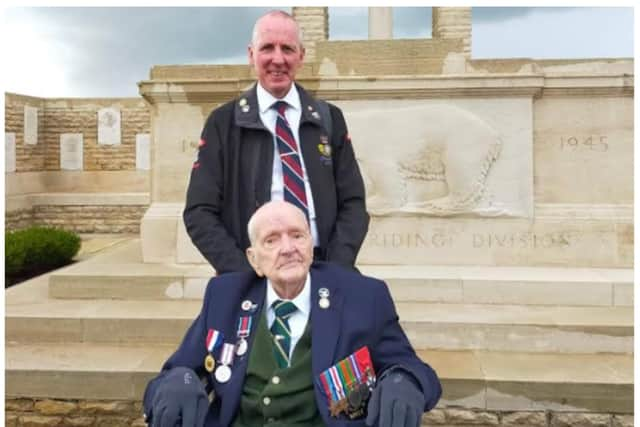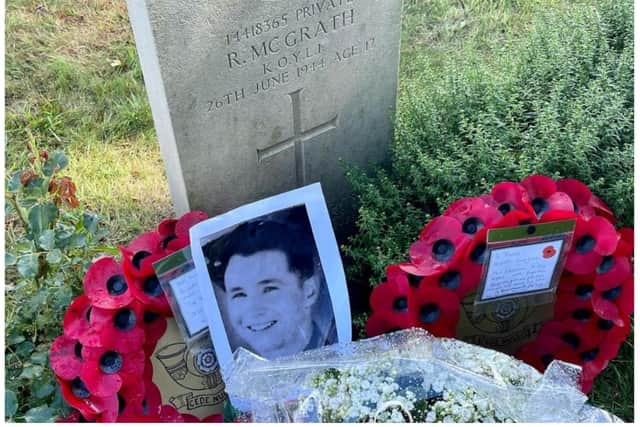102-year-old Doncaster WW2 D-Day hero honoured with civic reception in France
and live on Freeview channel 276
Fred Adamson, who served with the 1st/4th Battalion Kings Own Yorkshire Light Infantry, retraced his footsteps on the beaches of Normandy on his latest visit to France where he was given a hero’s welcome once again.
Fred, who hails from Conisbrough, had a number of narrow escapes during his time fighting during the war – and was honoured with a civic reception in the town of Fontenay-Le-Pesnel with signs lit up in his honour in recognition of his and his comrades work in the liberation of France.
Advertisement
Hide AdAdvertisement
Hide AdGrandson Phillip Knight, who accompanied Fred on the trip, said: “We went to see the battlefields where he fought.


"We travelled with the KOYLI, Light Infantry and Rifles Association who arranged the tour.
"Whilst there we visited the new British Normandy Memorial which records the names of the 22,442 servicemen and women under British command who fell on D-Day and during the Battle of Normandy which includes many of Fred’s comrades.
"We also visit our American allies cemetery at Ohama beach and also visited Gold beach where Fred landed in the days after D-Day.”
Advertisement
Hide AdAdvertisement
Hide AdThe group held a number of remembrance services on the tour which included Last Post ceremonies and Fred paid tribute to fellow Conisbrough serviceman Ronnie McGrath.


Ronnie was just 17 years of age when he was killed near Tessel Wood, Normandy on 26 June 1944.
Lance Corporal Adamson was awarded French military honour the Légion d’Honneur in 2016
He landed on the Normandy beaches four days after D-Day and was involved in furious fighting, taking part in the Battle of Normandy in what became know as the "Battle of the Bocage" – the battle of the hedgerows.
Advertisement
Hide AdAdvertisement
Hide AdSaid Fred: “Our Battalion landed in Normandy on Gold beach on 10 June 1944.


"When we left the assault craft, most of us had to wade in the sea at waist height – in my case, as I am only 5 feet 2 inches, it was almost up to my neck -to reach the beach.
"It was all rather frightening not knowing what we were going to encounter, but by this time the beaches had been cleared of the enemy and there was only gunfire here and there.
"A few days later, after marching inland we made our first contact with the Germans when we entered a copse and found the enemy facing in at the other side and only about 40 metres away, our first real experience of enemy fire.
Advertisement
Hide AdAdvertisement
Hide Ad“Our first major operation on 16 June 1944 was to take part in the attack on Cristot.


"During and following the attack, eight of our Battalion were killed, including five from my Company, 'A' Company and 30 or so wounded.
He nearly lost his life in October 1944 – but was saved because he was a smoker.
Explained Fred: "I was wounded on 9 October 1944 at Poppel on the Belgium side of the Dutch border when I was hit by shrapnel.
Advertisement
Hide AdAdvertisement
Hide AdHe added: “I knew I’d been hit as my leg was blooded but it wasn't until I was at the field hospital, when I was given some cigarettes that I realised what had happened.
“As I went to put them in my cases, I realised my two cigarette cases had saved my life.
"The shrapnel went through the top of first, clipped each page of his army pay book and then dinted the second case.
The retired wages clerk, who was born in Kimberworth, moved to Conisbrough in 1925, when he was a six year old.
Advertisement
Hide AdAdvertisement
Hide AdAfter going to Morley Place school, Fred won a scholarship to Mexborough Secondary School, as it was then called, later known as Mexborough Grammar School.
Leaving school, he got a job for the Amalgamated Denaby Collieries – the company running the pits at Denaby, Dinnington, Rossington, Maltby and Cadeby – as a wages clerk.
But his life changed when he was called up by the army on February 15, 1940, and put into the 1/4 battalion, KOYLI.
After suffering his injury, Fred was sent back to Britain, and married his wife, Elsie Robinson, in January 1945. Elsie died several years ago.
Advertisement
Hide AdAdvertisement
Hide AdAfter the war ended, he was posted to Italy, before being allowed to leave in 1946.
He returned to his job in Conisbrough, and joined the newly nationalised British Coal in 1947. He went on to become head wages clerk, and then went onto be assistant industrial relations officer, before retiring in 1984, aged 65.
He has five children, seven grandchildren, and 12 great grandchildren.